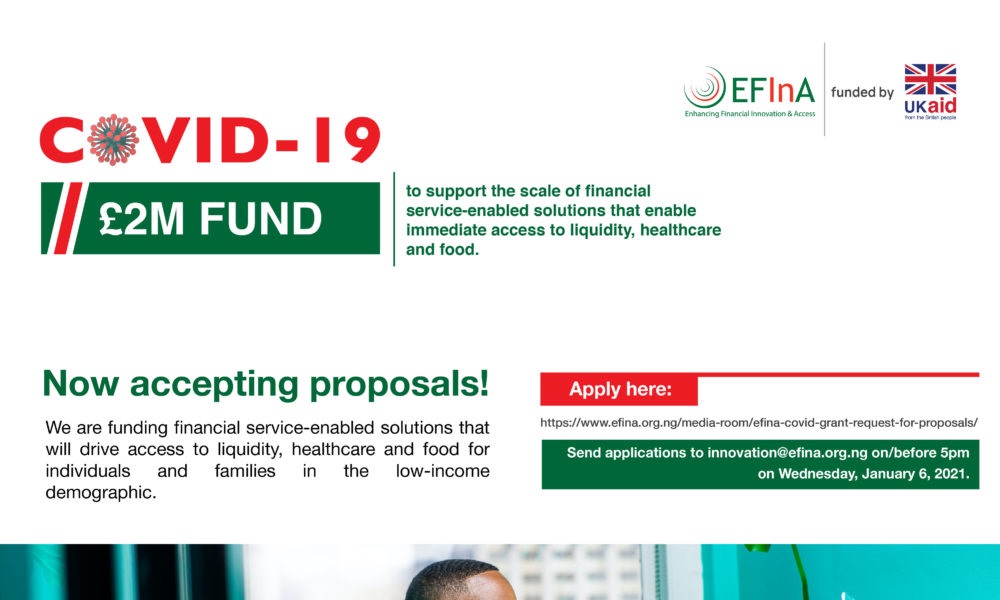EFInA is pleased to announce its request for proposals (RFP 10) for the COVID-19 Grant. This grant will focus on supporting solutions that can mitigate the far-reaching impact of COVID-19 on low-income individuals/households (defined as those earning N50,000 or less per month) and MSMEs in Nigeria. The objective of the EFInA COVID-19 Grant is to support the scale of financial service-enabled solutions that enable immediate access to liquidity, healthcare and food, and EFInA will dedicate a fund size of £2 million to achieve this, with an individual grant range of £50,000-500,000.
The COVID-19 pandemic has largely had a detrimental effect on households and businesses across Nigeria. However, the pandemic did come with some positives; NIBSS’ June 2020 transaction data reflected a 400% Year on Year growth in digital transactions during the COVID-19 lockdown, as people were forced to observe social distancing. Consequently, we are exploring ways to leverage this digital adoption trend to solve some of the most pressing needs of low-income households and individuals (particularly women and children) and MSMEs.
Background
The emergence of the COVID-19 pandemic had negative implications on the Nigerian economy, including disruption in supply chains, loss of jobs and bankruptcy as general activity was affected by limited mobility. The pressing needs we aim to address with this grant are:
- Liquidity:
Nigerian households and businesses experienced decreased incomes because of market closures, travel restrictions, and reduction in demand due to the pandemic. In recent studies, Nigerian households have reported that their total income decreased compared to the same period a year ago, with this decrease evident across the three main sources of income (wages, agriculture, and non-farm enterprise). The majority of MSMEs surveyed have also reported the pandemic’s negative impact on their cashflows, sales and, consequently, revenues.
- Healthcare:
Prior to the COVID-19 pandemic, measures of healthcare access in Nigeria remained below international benchmarks, contributing to dire health outcomes such as 1 in 8 Nigerian children not surviving to age 5. The pandemic may exacerbate preventable diseases and child and maternal deaths, as routine public health measures are likely to be interrupted due to people’s fear of attending health services during the pandemic, as well as shortages of supplies and personnel. Since the start of the pandemic, about half of Nigerian adults have reported experiencing price increases in medicines, with some Nigerian adults reporting that they are unable to access required medicines at all.
- Food:
According to recent surveys, one of the most widely experienced shocks in Nigeria continues to increase in the prices of major food items consumed. Approximately two-thirds of Nigerian households experienced food insecurity as of August. Since the pandemic began, farmers have reported higher prices of farming inputs and difficulty selling livestock or crops, presenting a risk of future food shortages if farmers are not able to invest in planting.
Requirements :
- The duration of the COVID-19 Grant is a minimum of 6 months and a maximum of 2 years
- The individual grant range is £50,000-500,000.
- Applicants must have, or partner with an organisation that has, a track record of success for providing digital financial services
- Applicants must provide a strong business case that demonstrates how the proposed solutions meet the immediate needs of the low-income population (defined as those earning N50,000 or less per month) and/or MSMEs
- Applicants must demonstrate the gender inclusivity of their product design and customer acquisition plans
- Applicants must indicate that they have the capacity to implement the proposed project and demonstrate impact within 6 months
- In addition to immediate impact, proposed solutions must have the potential for long term impact and sustainability
Get more details and apply HERE
Application closes on January 6, 2021









